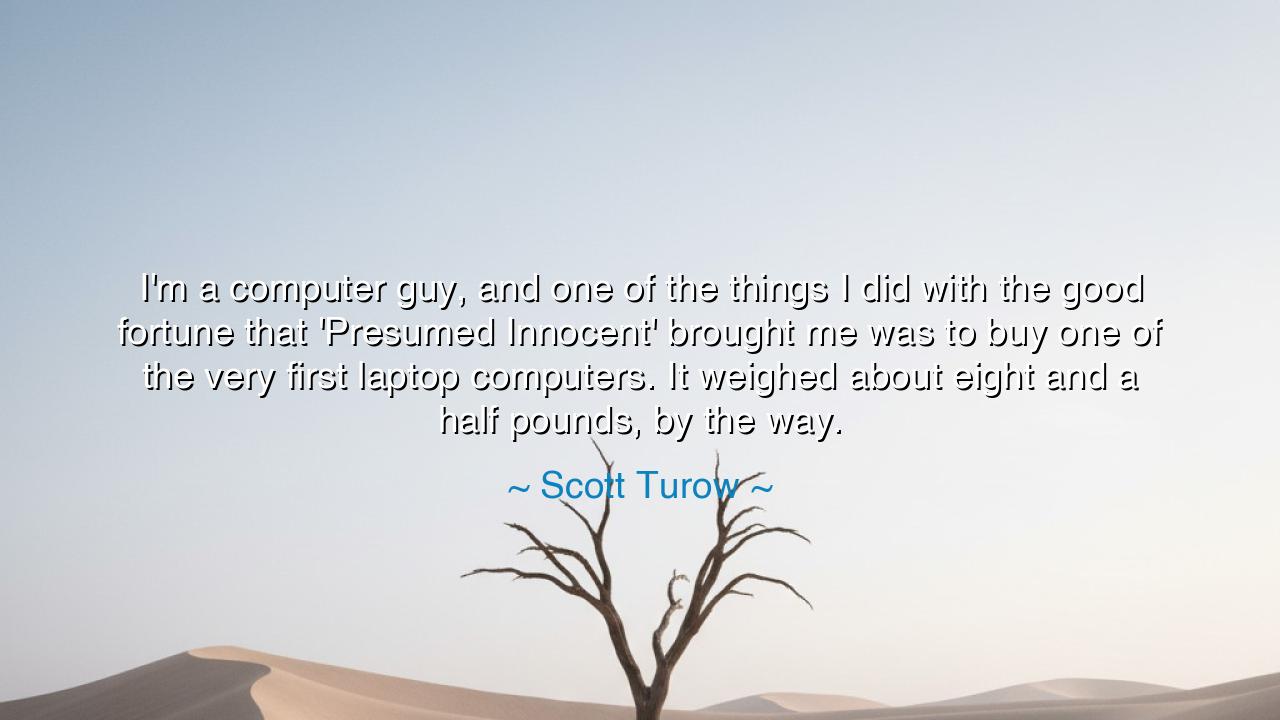
I'm a computer guy, and one of the things I did with the good
I'm a computer guy, and one of the things I did with the good fortune that 'Presumed Innocent' brought me was to buy one of the very first laptop computers. It weighed about eight and a half pounds, by the way.






In these words, Scott Turow, author of Presumed Innocent, reveals more than a passing fascination with machines; he reveals a truth about human curiosity and transformation. When he calls himself a “computer guy,” it is not merely a statement about profession or hobby. It is a declaration of kinship with progress itself. The world was changing—silicon was replacing ink, and pixels were beginning to share the same sacred space as paper. Turow, fresh from literary triumph, did not retreat into comfort; instead, he sought to understand the tools that would shape the future. His first laptop, weighing a burdensome eight and a half pounds, becomes a symbol of this early fusion between imagination and technology—a relic of an age where innovation demanded both faith and strength of arm.
In the ancient way, his words remind us that every new invention begins as a heavy burden. Like the first ships that cut through stormy seas or the early plows that tore through unyielding soil, the first computers were awkward, weighty, and limited. Yet those who lifted them with faith carried humanity forward. Turow’s heavy machine, primitive by today’s standards, was a tool of wonder—a bridge between the world of ink and the realm of code, between human imagination and digital permanence. It stands as a metaphor for the courage to embrace the unknown before it becomes familiar.
There is something deeply heroic in the image of a writer, a man of words and metaphors, embracing the cold hum of circuits and keys. In that act, Turow embodied a timeless truth: the creator must evolve with creation. Just as Da Vinci sketched his flying machines, just as Gutenberg’s press reshaped the written word, Turow’s curiosity reflected the eternal flame of invention. The first adopters of new tools are often mocked or misunderstood, but they pave the roads on which future generations travel effortlessly.
Consider the story of Douglas Engelbart, the inventor of the computer mouse. In the 1960s, when computers filled entire rooms and were the domain of scientists alone, Engelbart envisioned a world where ordinary people could interact with machines through touch and motion. He was ridiculed; few believed in his vision. Yet like Turow, he saw beyond the bulk and weight of early technology into the shimmering potential that lay ahead. His invention—like Turow’s heavy laptop—was a seed of transformation, small yet destined to grow into something that would reshape humanity’s way of thinking, working, and creating.
Turow’s reflection also carries a note of gratitude and humility. He acknowledges his “good fortune”—the success that gave him access to innovation. There is wisdom in this humility. It reminds us that privilege becomes sacred only when it fuels curiosity and learning. Wealth and fame are hollow if they do not serve as bridges to discovery. Turow did not use his earnings merely for comfort; he used them to explore the future, to remain a student of the world even after success had crowned him.
From his brief recollection rises a universal lesson: never allow comfort to dull your curiosity. The moment we stop exploring, we begin to decay. Whether it is a machine, a language, or a new way of living, we must dare to lift the “eight-and-a-half-pound” burdens of our time—those awkward, early versions of progress that the timid avoid and the bold embrace. Progress is never light at first; it gains grace through generations of hands willing to carry its weight.
Thus, let this quote stand as a call to courage and adaptation. Embrace the new, even when it feels clumsy or uncertain. Honor your curiosity as Turow did, for it is through curiosity that civilizations advance and individuals remain alive to wonder. To those who walk in the age of ceaseless innovation, remember: each great tool begins as an unpolished stone, and each discovery requires the heart of one who dares to carry its early weight.
Final Lesson: The wise do not fear the new; they honor it by learning from it.
Practical Actions: Seek to understand the tools of your age. Use your success to explore rather than rest. Welcome discomfort as the cost of growth. And when you encounter a burden heavy with potential—whether it be a task, an idea, or a piece of technology—lift it willingly, for in its weight lies the promise of transformation.






AAdministratorAdministrator
Welcome, honored guests. Please leave a comment, we will respond soon